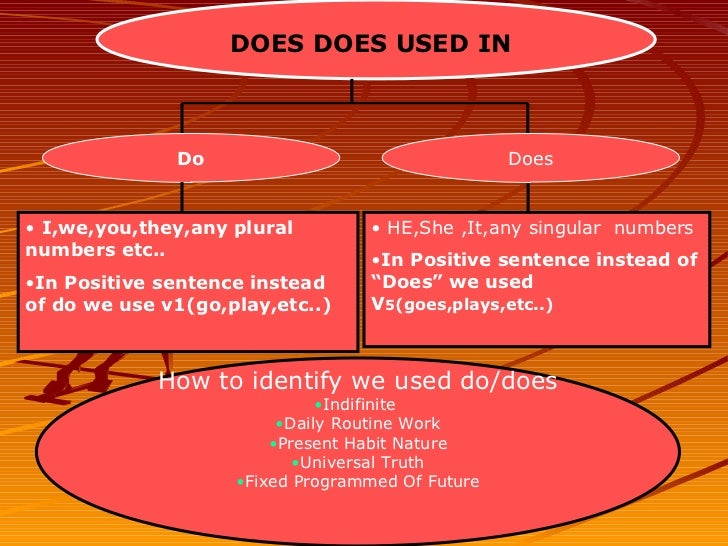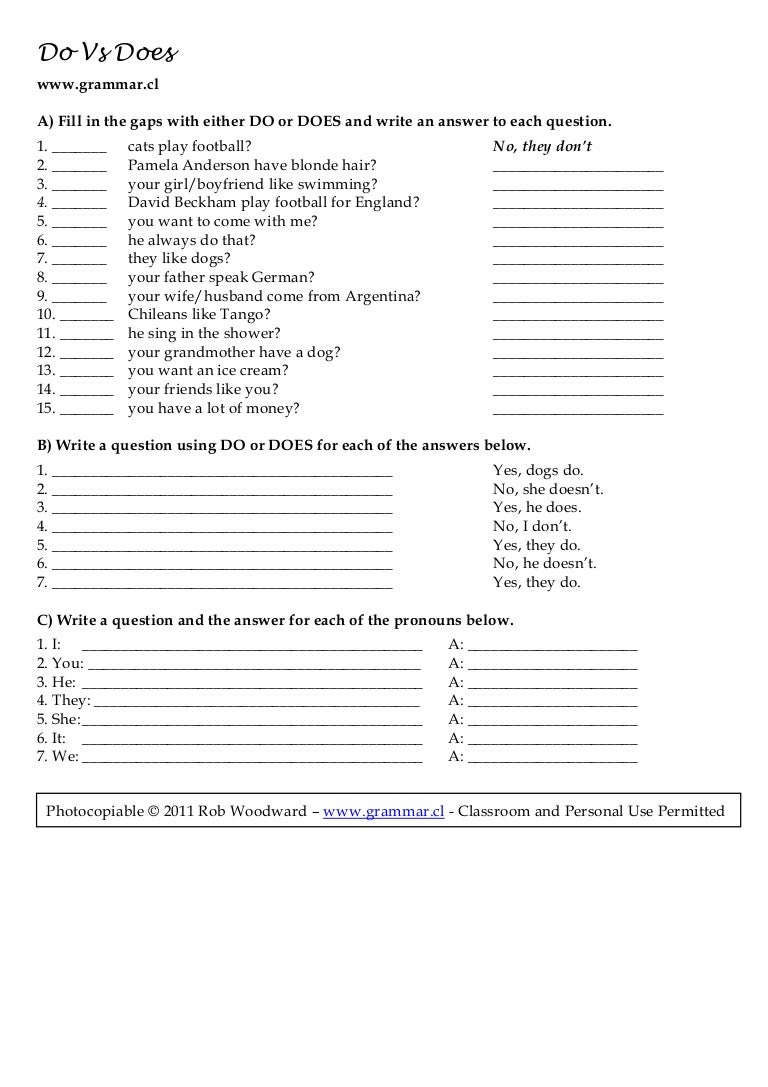
Do, Does, Don't, Doesn't worksheet Free ESL printable worksheets made by teachers English
Do or does. The forms "do" and "does" of the verb "to do" are in present tense form. The key to understanding whether to use "do" or does" is to determine whether the noun in the sentence is singular (and the person neither "I" nor "you") or plural. A singular noun refers to only one person, one place or one thing, and.

Do does
Do Does test asks for the difference between do and does. Do is used for I, you, we, and they while does is for the third person.

FRAGEN UND ANTWORTEN BEI DO / DOES / DONT & DOESNT, antworten doesnt fragen present
When the subject is he, she or it, we add DOES at the beginning to make the affirmative sentence a question. Notice that the letter S at the end of the verb in the affirmative sentence (because it is in third person) disappears in the question. We will see the reason why below. We DON'T use Do or Does in questions that have the verb To Be or.

Pin on Angol
Do. Use do with the subjects I, we, you and they. Do is usually used to make questions and it comes at the start of a sentence. Do is not used with the verbs be, can, might, ought, shall and will. Do I have to speak too?

Using Do and Does, Definition and Example Sentences USING DO AND DOES The verb “Do” has two for
To do - worksheets Exercises pdf - lessons . Do / does - worksheet; Simple present - interrogative; Do/does - word order-> answers; Do / does / did - worksheet; Do / does - worksheets; Don't / doesn't - worksheets; Worksheets pdf - print; Grammar worksheets - handouts; Lessons - videos - resources. What are auxiliary verbs grammar / practice.

Using Do and Does, Definition and Example Sentences English Grammar Here English
Negative sentences in simple present use do or does. Structure. Subject + Do/Does + Not + Verb. Examples: I do not like hockey; She does not live in Brazil. Contractions. Do not = Don't Does not = Doesn't. Examples: They don't have a dog. He doesn't want a drink. Verb Structure. The verbs after "do" and "does" are always in the.

Uses DO and DOES, Definition and 7 Examples The verb “Do” has two forms in the prese… Teaching
DO NOT and DOES NOT - the verb DO in negative sentences. The verb DO (and DOES in third person singular) is also helpful if you want to make a sentence negative. Once again, DO and DOES are used as auxiliary verbs in negative statements. The rule is quite simple. To make a sentence negative, add 'not' (or the contracted form 'n't.

Pin on English Grammar, ESL, EFL
Missiles were launched overnight into Friday, hitting dozens of sites - with some casualties reported. The Houthis say they are not deterred by the attacks, but the US suggests the strikes have.

Neues von Legakulie Englisch 5.Klasse do does Übung Klassenarbeit
Do - English Grammar Today - a reference to written and spoken English grammar and usage - Cambridge Dictionary

DODONTDOESDOESNT bildung Pinterest Englisch, Bildung und Grammatik
1:43. President Joe Biden said the US did not support independence for Taiwan, after voters there defied China and returned the governing Democratic Progressive Party — which has sought to limit.

Pin on angol
Do and does are two words that are often used interchangeably, but they have different meanings and uses. Understanding the difference between these two words is important in order to use them correctly in sentences. While both are forms of the verb "to do," they are used in different contexts and with different subjects. Contents Do vs. Does

Do, Does, Did worksheet Free ESL printable worksheets made by teachers English grammar
Negative sentences with do not, does not and did not. When creating negative sentences, we usually use shortened forms: don't, doesn't and didn't together with the base form of the verb. Note: Save the long forms (do not, does not and did not) for when you want to create emphasis. When speaking, you would put an accent on the 'not'.

Entscheidungsfragen mit do und does YouTube
The main definition of "do" is "to accomplish an action." The main definition of "does" is "a reference to the accomplishment of another." Both words mean basically the same thing, because "does" is the third person singular present tense version of "do." The difference is in how each word gets used. Similarities

Arbeitsblatt "Do / don & t / does / doesn & t" Kostenlose druckbare ESLArbeitsblätter von
The difference between DO and DOES in English and how to make questions in the simple present tense.We follow the order of auxiliary + subject + verbWe learn.

do, does, don't, doesn't general gra… English ESL worksheets pdf & doc
If the subject is singular, you will likely use the word "does.". If the subject is plural, or it is the personal pronoun "I'" or the second-person pronoun "you," you will use "do.". One exception to this rule is in imperative sentences. That is one instance where you will always use "do," even if the subject is singular.

Do does (1)
And former presidents are not immune from being held accountable by either one.". Trump and his attorneys clearly think otherwise, and they don't mind the circular argument. His supporters.